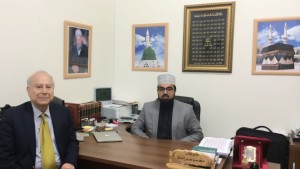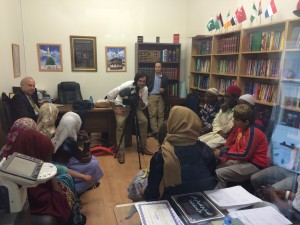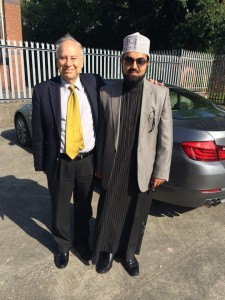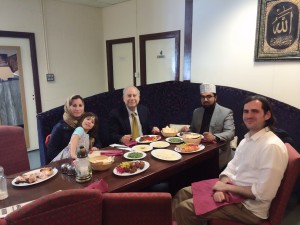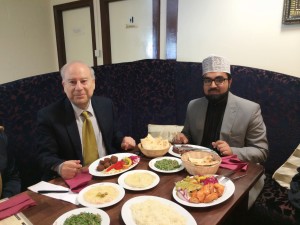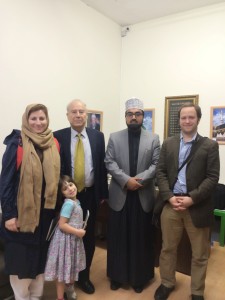Prof. Akbar Ahmed, internationally renowned scholar of contemporary Islam, visits Al-Mustafa Islamic Centre Ireland
On the 31st May 2014 Prof Akbar Ahmed and his team of Researchers (Dr. Amineh Hoti, Craig Considine and Frankie Martin) visited the Al-Mustafa Islamic Centre Ireland to interview the Imam and students of the Islamic School for the research project :“Journey into Europe; Islam, Immigration& Empire”.
Professor Akbar Ahmed is probably the world’s best known scholar on contemporary Islam. He is the former High Commissioner of Pakistan to Great Britain, and has advised Prince Charles and met with PresidentGeorge W. Bush on Islam. He is now Ibn Khaldun Chair of Islamic Studies and professor of International Relations at American University in Washington, DC.
Professor Ahmed is the author of many books on contemporary Islam, including Discovering Islam: Making Sense of Muslim History and Society, which was the basis of the BBC six-part TV series called Living Islam. His Postmodernism and Islam: Predicament and Promise was nominated for the Amalfi Award, and his “Jinnah Quartet,” a four-part project on Pakistan’s founding father, M.A. Jinnah, has won numerous international awards. He is currently the chair of Islamic Studies in American University of Washington.
The Imam & Ameer of the Islamic Centre (Shaykh Dr. Muhammad Umar Al-Qadri), Brother Muibideen, Brother Arif, Ustaza Shahida, Ustaza Aisha and students of Al-Mustafa Islamic School welcomed Prof. Akbar S. Ahmed and his team to the Islamic Centre.
Shaykh Dr. Muhammad Umar Al-Qadri thanked the esteemed Professor for his visit and the offer of interviews for the purpose of the significant research. Shaykh said that it was an honour to host Prof. Akbar S. Ahmed in the Islamic Centre considering he is among the leading scholars today of contemporary Islam. Shaykh also prayed for the long and healthy life of the learned Professor so he will benefit the society more with his work to bridge cultures and civilisations.
Students of Al-Mustafa Islamic School were interviewed and Prof. Akbar Ahmed and his team were very impressed by the answers of the young students. The students that were in their early teen ages were very confident about their Muslim identity and importance of Peace and Inter Faith dialogue.
Students of Al-Mustafa Islamic School were given a very beautiful advice by Professor Akbar Ahmed. Professor Ahmed told them to remember a very significant Hadith that highlights the importance of Knowledge in Islam. The Hadith is that the Prophet Muhammad (Peace & Blessings be upon Him) said: “The Ink of the Scholar is more sacred than the blood of the Martyr”.
After interviewing the students a lunch was organised by nearby Lebanese restaurant “Falafull”.
After the lunch the team interviewed the Imam, Shaykh Dr. Muhammad Umar Al-Qadri, on Muslim identity, Islamophobia and other topics related to contemporary Islam.
Concluding the meeting after the interview of the Shaykh, Prof. Akbar Ahmed mentioned that he was very happy to see that Irish Muslims have a young, educated and charismatic leader in the form of Shaykh Dr. Muhammad Umar Al-Qadri. Prof. Akbar Ahmed also mentioned that he was very glad that the Al-Mustafa Islamic Centre is a very diverse Islamic Centre and promotes peace, unity and integration in Ireland.
Prof. Akbar Ahmed advised the Shaykh to continue to work for the broader message of Islam to bring communities together and not work for a particular organisation, ideology or group within Islam.
Introduction to Journey into Europe: Islam, Immigration, and Empire
Prof. Dr. Akbar Ahmed
Over the last decades I have committed myself to understanding and explaining the complex relationship between the West and theMuslim world. After 9/11 it became a matter of urgency for me to both explore and explain the relationship as the gap between the two had opened dangerously wide. I believed it was not possible to understand what was happening in our world without exploring the different societies and points of view that were involved. In particular I worked on three major projects, all published with Brookings Press, related to this theme – exploring what Muslims thought of the US and the West, how Americans, in turn, perceived Islam and Muslims, and an examination of the interstices between states in those tribal and peripheral societies where the real “war on terror” is taking place. The first study resulted in Journey into Islam: The Crisis of Globalization (Brookings 2007); the second was calledJourney into America: The Challenge of Islam (Brookings 2010; Winner of the 2011 American Book Award) and the third The Thistle and the Drone: How America’s War on Terror Became a Global War on Tribal Islam (Brookings 2013; Winner of the German Peace Prize and short-listed for the Coca-Cola Award for Best Non-Fiction Book at the 2014 Karachi Literature Festival). To complete the quartet, I will explore an area that is vital to the understanding of relations between the West and Islam, the Muslim communities of Europe.
Complicated and controversial issues including Sharia, jihad, terrorism, Muslim female dress, in addition to the fear of being overwhelmed by migrants, especially from Muslim lands that were dominated by Western imperialists not that long ago, haunt Europeans. Issues of Islam, immigration and the former empires and their legacies provide a frame to analyze Europe and its relationship with Islam today which I will explore in a new study, Journey into Europe: Islam, Immigration, and Empire. In order to investigate these crucial issues, I intend to embark with a team of scholars and researchers, who have worked with me on my previous projects, on a European tour. We will travel, conduct interviews and questionnaires, observe and read in order to explore the questions that have been raised above.
For the British leg of our journey, we will be working with team members from Professor Peter Morey’s Muslims, Trust and Cultural Dialogue project. Funded by the Research Councils UK as part of their Global Uncertainties scheme, this project shares our goals of understanding and exploring what makes for intercultural and interfaith understanding. MTCD are providing researchers and logistical support as we travel around the country conducting interviews with selected individuals and groups who may be able to shed new light on the actual state of relations between Muslims and others. They are assisting in gathering and processing data and the project website will provide an initial portal for our findings as they emerge.
The study will result a published book titled Journey into Europe: Islam, Immigration, and Empire by Brookings Institution Press which will be the fourth part of a quartet of books by Ambassador Ahmed [including Journey into Islam (2007), Journey into America(2010), and The Thistle and the Drone (2013)]. In addition, Journey into Europe will result in a documentary film based upon the fieldwork, as was done previously for the Journey into America project. The critically acclaimed documentary film Journey into America(2009), directed by Craig Considine and produced by Akbar Ahmed, has been shown at film festivals around the world. We will be sharing our provisional findings via the Muslims, Trust and Cultural Dialogue website, and posting initial footage from the journey as it progresses.
Using these various media, Journey into Europe will add to the already rich literature on the subject. Because it is based in extensive fieldwork interviews, the study will convey the urgency of the situation and also the wisdom of the people we will meet through the length and breadth of Europe. In that way, we will be able to contribute to building bridges between the different religions and cultures of Europe.
I propose to examine the following thesis: the European historical experience with Islam has much to teach us today about relations between the West and the Muslim world. It provides us with examples of communities living together, producing art, architecture and literature of the highest quality, while belonging to different religions and cultures and maintaining their own integrity. Muslim Spain and Sicily a thousand years ago provide us early examples. We read of a Muslim king whose chief minister was Jewish, and so powerful that he had his son appointed as his successor; the chief physician of the most powerful Muslim ruler of what we now know as the Middle East was recognized as one of the greatest Rabbis of those times; and the Christian Norman king who, after conquering Sicily, treated his Muslim subjects with respect and even encouraged the preservation of their culture (while, at the other end of Europe, his kinsmen were persecuting and oppressing fellow Christians in England). The scholars of the time lived and worked in what had become the shared culture of Andalusia and used Arabic as the lingua franca. Averroes and Maimonides both born in Cordoba wrote their great works in Arabic. Historians call this coexistence between Jews, Christians and Muslims La Convivencia. There are also other examples of Christian kings, like those with a Germanic background like Frederick II, who embodied this spirit of La Convivencia.
This discussion about Europe and Islam can, in turn, assist the West in its interaction with Islam and the ongoing – and increasingly amorphous – “war on terror.” However, to learn from the examples in European history, we must get past the widespread and distorted stereotypes the West and the Muslim world have about each other.
Given the seriousness of the situation, with news stories about intercultural mistrust appearing almost everyday, Journey into Europeis a vital exercise. The lessons of a society in which different religions and cultures can live together, create art together, and worship freely while respecting each other, is a desperately needed model to guide us today. Taken together, it is my hope that this book can offer new insights into how both the differences and similarities in the relationship with Islam in Europe and the United Stated can render a positive contribution to furthering individual governments’ and people’s efforts in coming to terms with our joined twenty-first century’s multicultural and pluralistic realities.
Akbar S Ahmed, 2014
Ibn Khaldun Chair of Islamic Studies
4400 Massachusetts Avenue, NW Suite 200 G Washington, DC 20016 202-885-1641
